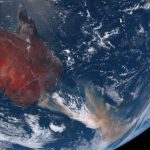 May 27, 2021 12:11 pm
Published by Climate Extremes
May 27, 2021 12:11 pm
Published by Climate Extremes
An unusual southern stratospheric warming event amplified the conditions that led to the Black Summer bushfires of 2019/20. CLEX researchers explored how frequently these rare warming events may occur with climate change.
 March 18, 2021 1:16 pm
Published by Climate Extremes
March 18, 2021 1:16 pm
Published by Climate Extremes
This research around central Pacific El Niños is important for agricultural and water resources planning efforts in the Murray Darling Basin region and may help with seasonal prediction efforts to predict drought‐breaking rain such as occurred in early 2020.
 December 14, 2020 11:45 am
Published by Climate Extremes
December 14, 2020 11:45 am
Published by Climate Extremes
It has been remarkable how much we have achieved in this extraordinarily difficult year. Research coming out of the Teleconnections and Variability program over the past four months has strongly focused on how influences in one part of the world can have direct impacts on another.
 August 17, 2020 1:55 pm
Published by Climate Extremes
August 17, 2020 1:55 pm
Published by Climate Extremes
Despite the pandemic, the recent few months have seen a range of triumphs with completed PhDs being prominent among them. Our research has revealed the powerful influence of small scale and large scale ocean processes on our current and future climate.
 August 11, 2020 10:25 am
Published by Climate Extremes
August 11, 2020 10:25 am
Published by Climate Extremes
CLEX researchers and colleagues investigated how El Niños may change in the future using paleoclimate data in combination with CMIP5 and CMIP6 model runs.
 July 29, 2020 11:40 am
Published by Climate Extremes
July 29, 2020 11:40 am
Published by Climate Extremes
CLEX researchers and colleagues have highlighted the need for the development of systems to predict marine heatwaves, which are a growing threat to marine ecosystems and industries as the climate changes.
 July 18, 2019 3:00 am
Published by Climate Extremes
July 18, 2019 3:00 am
Published by Climate Extremes
In this project, we will investigate the links between precipitation extremes and the Interdecadal Pacific Oscillation (IPO), including its signature in El Niño–Southern Oscillation (ENSO) impacts, across tropical land regions.
 July 15, 2019 1:00 am
Published by Climate Extremes
July 15, 2019 1:00 am
Published by Climate Extremes
This project will use output from state-of-the-art climate simulations of the Last Millennium (850–2005 CE) to explore the long-term variability of an Australian climate driver of the student’s choice. The student will explore the natural variability of that driver to determine its long-term context, and compare with palaeoclimate reconstructions (proxies) where possible.
 June 15, 2019 7:16 am
Published by Climate Extremes
June 15, 2019 7:16 am
Published by Climate Extremes
An international team, led by Australian researchers from the ARC Centre of Excellence for Climate Extremes (CLEX) and the Institute for Marine and Antarctic (IMAS) studies, have published in Nature Communications the first global assessment of the major drivers of marine heatwaves.
 June 5, 2019 3:47 pm
Published by Climate Extremes
June 5, 2019 3:47 pm
Published by Climate Extremes
In a world first, CLEX researchers have produced a 400-year-long record of El Nino activity. This gives us an entirely new insight into the behaviour of these high impact events and reveals unprecedented changes over the past 30 years.










